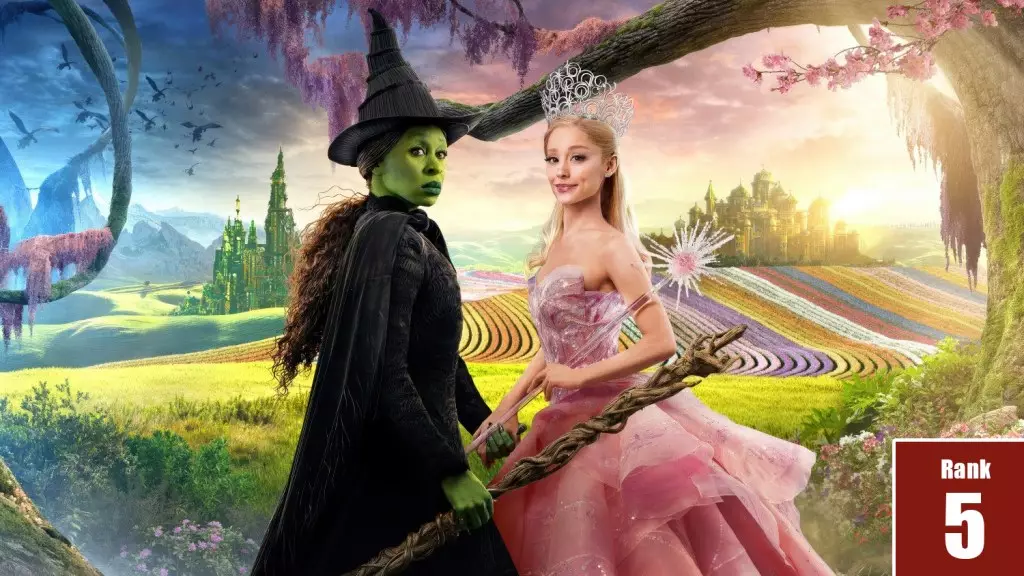In the ever-evolving landscape of film profit calculations, the traditional box office numbers no longer define success as they once did. This reality is starkly highlighted by Deadline’s Most Valuable Blockbuster tournament, which reveals how critical it is to take downstream revenues and diverse release platforms into account. In 2024, cinema enthusiasts are witnessing a transformative era where streaming giants like Amazon and Apple continue to reshape the industry’s economic parameters. These platforms view theatrical releases as simply one part of a larger ecosystem, making it impossible to assess the full impact of a film merely by its box office take. As a result, by excluding these major players from the evaluation process, we’re left with a clearer view of how traditional studios measure success.
Wicked’s Long Journey to the Silver Screen
If there is one movie that exemplifies the persistence required in modern filmmaking, it is Wicked. This widely anticipated adaptation of the hit Broadway musical, born from Gregory Maguire’s 1995 novel, has spent nearly three decades in development hell. The allure surrounding this project is not just the fascinating storyline but also the underdog tale of its creation, involving fluctuating producers and directors until Jon M. Chu finally took the reins. Sweeping wins on Broadway didn’t guarantee a smooth transition to cinemas, particularly after the dismal performances of other adaptations like *Dear Evan Hansen* and *In the Heights*. However, the fans’ commitment and the remarkable resilience of the creative team stand as a testament to the age-old adage: good things come to those who wait.
What Makes Wicked a Cultural Phenomenon
In crafting the film version of Wicked, the filmmakers recognized something fundamental—its appeal isn’t just tied to the catchy songs or stunning visuals; it’s rooted in a narrative that resonates. The story deconstructs the stereotypical portrayals of good and evil, effectively redefining the audience’s connection to its characters. With a tight grasp on social themes that speak to current issues—empowerment, choice, and identity—Wicked rises above mere entertainment to become a cultural phenomenon. It’s a reflection of a generation grappling with complex themes, and that’s where its true value lies.
Marketing Madness: A Strategy Like No Other
Wicked’s marketing strategy deserves a spotlight of its own. Universal Pictures orchestrated a mammoth marketing campaign, rivaling some of the largest film franchises in history. With an investment of approximately $170 million, the movie leveraged a powerful global outreach strategy involving more than 400 partners, including brands as varied as Starbucks to Lego. Such extensive collaboration not only amplified the film’s visibility but also engaged audiences across different demographics. This innovative approach reflects a savvy understanding of the modern viewer—one who is not just passive but actively seeks to be part of the experience. The fact that this campaign overlapped with various high-visibility events like the Super Bowl showcases a bold readiness to redefine promotional norms.
Box Office Wins and Unexpected Metrics
At the box office, Wicked achieved phenomenal success by breaking records with an opening of $112.5 million—making it the highest-grossing feature adaptation of a Broadway production to date. However, it isn’t just the immediate ticket sales that proved lucrative; the film’s exclusive 40-day theatrical window before transitioning to Premium VOD generated a staggering $100 million for Universal. Considering the film’s dominance on streaming services—topping Nielsen ratings with 882 million minutes viewed within its premiere week—Wicked’s real strength lies in its ability to capitalize on multiple revenue sources.
The Profit Calculation: More Than Just Numbers
When evaluating Wicked’s financial prowess, one cannot overlook the astounding net profit of $230 million after accounting for all ancillary revenues. This figure serves as an affirmation of the joint venture between cinematic excellence and marketing genius. With ten Oscar nominations and two wins, including Best Costume and Production Design, Wicked’s influence will undoubtedly extend far beyond its theatrical run. The performances of Ariana Grande and Cynthia Erivo do not merely stand out in the film—they actively engage in a continuing narrative that draws in audiences for not just one, but two cinematic experiences.
The Future is Bright…and Green
As we look to the future of film in a rapidly changing world, Wicked serves as a beacon of what’s possible when visionary storytelling meets strategic marketing. The scheduled release of the sequel, *Wicked: For Good*, only amplifies the anticipation. The journey of Wicked raises vital questions about narrative depth, market engagement, and the responsibility filmmakers hold to their audiences. It sends a clarion call to Hollywood: to innovate, adapt, and embrace change in a lucrative yet challenging landscape, one that extends well beyond theater doors.

